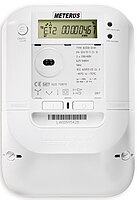
Photo from wikipedia
PurposeThis article aims to compare smart meters' acceptance studies worldwide to consolidate trends and highlight factors that are not a consensus.Design/methodology/approachThis work performs a statistical meta-analysis, using the Hunter–Schmidt method… Click to show full abstract
PurposeThis article aims to compare smart meters' acceptance studies worldwide to consolidate trends and highlight factors that are not a consensus.Design/methodology/approachThis work performs a statistical meta-analysis, using the Hunter–Schmidt method and the UTAUT2 model, of the factors of acceptance of smart meters in the world literature. A meta-regression was also conducted to verify the moderation exercised by gender, level of education and timeline context of the articles.FindingsThe main results point to hedonic motivation, performance expectancy and effort expectancy as the leading influencers for smart meter's acceptance. Meta-regression indicates that the influence is more significant among the male gender and that over the years, the social influence must gain weight in the smart meter's acceptance.Social implicationsSpecific strategies are suggested to improve projects for the implementation of smart meters based on the obtained results.Originality/valueThe contribution given by this work is relevant, considering it is the first meta-analysis focused on smart meters' acceptance published in the literature
Journal Title: Smart and Sustainable Built Environment
Year Published: 2021
Link to full text (if available)
Share on Social Media: Sign Up to like & get
recommendations!